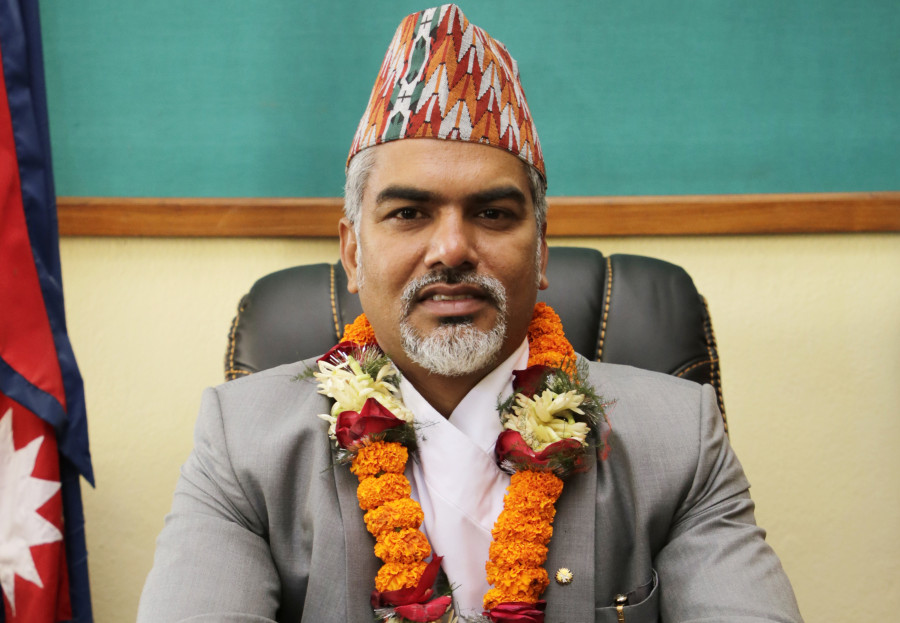National
As Ansari takes oath, questions arise over necessity of hearing committee
In the first ever case since the provision of parliamentary hearing was introduced in the country a decade ago, Samim Miya Ansari on Thursday became the chief of a constitutional body without being endorsed by the Parliamentary Hearing Committee.
Binod Ghimire
In the first ever case since the provision of parliamentary hearing was introduced in the country a decade ago, Samim Miya Ansari on Thursday became the chief of a constitutional body without being endorsed by the Parliamentary Hearing Committee.
Ansari had landed in controversy immediately after he was nominated for the post. There were questions about his academic credentials and date of birth.
The hearing committee had heard Ansari, but it had neither endorsed nor rejected him for the post. And the indecision resulted in his automatic appointment.
As per the existing legal provision, the hearing committee must take a decision on nominees for constitutional and ambassadorial posts within 45 days since their nomination.
The Federal Parliament Joint Meeting and Joint Committee (Work Execution) Regulation 2018 states that the appointment of the nominee will not be affected if the hearing committee fails to send its opinion to the authority concerned within the stipulated time.
A January 20 meeting of the Constitutional Council had decided to recommend Ansari to the Muslim Commission along with four others to other commissions. Though the hearing committee endorsed four other names, it did not decide on Ansari’s name as the lawmakers within the ruling parties were divided over his nomination.
Legal experts said though the parliamentary hearing system was introduced with good intention, over-politicisation has raised a question over its necessity.
Surendra Bhandari, a senior advocate, said the hearing system was started with the motive of overseeing the decision of the executive. “But in practice, the hearing committee started functioning as per the will of the political leadership that leads the executive,” Bhandari told the Post. “The hearing committee has failed to function independently and hence failed to work as per the spirit under which it was envisioned.”
Many believe Ansari was nominated for the post only because he was close to Prime Minister KP Sharma Oli. Ansari, who joined the then UML in June 2017, had told the Post in an interview that he was nominated as a reward for the contributions he had made to the party
Some ruling party leaders though were opposed to Ansari’s nomination, Oli had strongly stood in his favour.
The 15-member hearing committee, where the ruling party holds a clear majority, then chose to remain silent. The 45-day deadline expired and Ansari got an automatic appointment.
“The provision has been misused in Ansari’s case,” said Bhandari.
Krishna Bhakta Pokharel, a member of the House of Representatives, who led the regulation drafting process, said the spirit of the regulation is that the hearing committee should make its decision within the given time-frame.
“The very purpose of the hearing is to correct the decision of executive, if need be. It should either endorse or reject the recommendations,” he told the Post.
For the hearing committee to endorse a nominee, a simple majority is sufficient, but to reject a nominee, two-thirds of the members need to vote against. In a recent case of rejection, the committee had rejected Deepak Raj Joshee as the chief justice in August last year.
Experts fear Ansari’s case could set a precedent and the hearing committee could choose to remain silent on other nominations and recommendations, paving the way for the automatic appointment of the nominees.
“This will undermine the supremacy of Parliament,” Bhandari, the advocate, added.
Ansari and four other chairs of constitutional commissions were administered the oath of office and secrecy by Chief Justice Cholendra Shumsher Rana on Thursday.




 9.7°C Kathmandu
9.7°C Kathmandu














